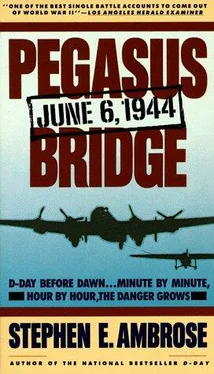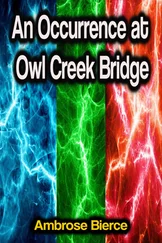Stephen Ambrose - Pegasus Bridge
Здесь есть возможность читать онлайн «Stephen Ambrose - Pegasus Bridge» весь текст электронной книги совершенно бесплатно (целиком полную версию без сокращений). В некоторых случаях можно слушать аудио, скачать через торрент в формате fb2 и присутствует краткое содержание. Жанр: История, на английском языке. Описание произведения, (предисловие) а так же отзывы посетителей доступны на портале библиотеки ЛибКат.
- Название:Pegasus Bridge
- Автор:
- Жанр:
- Год:неизвестен
- ISBN:нет данных
- Рейтинг книги:5 / 5. Голосов: 1
-
Избранное:Добавить в избранное
- Отзывы:
-
Ваша оценка:
- 100
- 1
- 2
- 3
- 4
- 5
Pegasus Bridge: краткое содержание, описание и аннотация
Предлагаем к чтению аннотацию, описание, краткое содержание или предисловие (зависит от того, что написал сам автор книги «Pegasus Bridge»). Если вы не нашли необходимую информацию о книге — напишите в комментариях, мы постараемся отыскать её.
Pegasus Bridge — читать онлайн бесплатно полную книгу (весь текст) целиком
Ниже представлен текст книги, разбитый по страницам. Система сохранения места последней прочитанной страницы, позволяет с удобством читать онлайн бесплатно книгу «Pegasus Bridge», без необходимости каждый раз заново искать на чём Вы остановились. Поставьте закладку, и сможете в любой момент перейти на страницу, на которой закончили чтение.
Интервал:
Закладка:
SURPRISE: Without surprise, obviously, there could have been no success. Any kind of a warning, even just two or three minutes before 0016, would have been sufficient for the Germans. Had Major Schmidt's garrison been alert when D Company landed, every man in the three gliders could have been killed by machine-gun fire before any got out. Surprise was complete, both with regard to method and target.
LUCK: Give me generals who are lucky said Napoleon, and so says every commander since. Howard and the British had more than their share of good luck. The best, probably, was the bomb that did not explode when it hit the bridge. (One is tempted to think that this was not just luck; it is at least possible that the bomb had been deliberately sabotaged by a French slave labourer in a German munitions factory.) It certainly was good luck that Thornton's Piat bomb set off the explosions inside the tank near the T junction. And it was wonderfully lucky that Hitler did not release the 21st Panzer Division to attack until after noon on D-Day.
METHOD: In his May 2 orders to Howard, Poett had said that the capture of the bridges would depend on 'surprise, speed, and dash for success'. In the event, Howard and D Company showed all three characteristics in carrying out their assignment. What did it all mean? Because the operation was a success, we can never know its full significance; only if it had failed would we know the real value of Pegasus Bridge. As it is, any assessment of the operation's worth is speculative. But then speculation is the secret vice of every history buff, and in any case is unavoidable when passing judgements.
Suppose, then, that Major Schmidt had managed to blow the bridges. In that event, even if Howard's men held both sides of both waterways, the easy movement that the British enjoyed over the bridges would have been impossible. Howard could not have brought Fox's platoon over from the river to Benouville, and Thornton would not have been by the T junction with his Piat. The most likely outcome, in that case, would have been a failure to hold the ground in the Benouville-Le Port area, with the resulting isolation of the 6th Airborne east of the Orne. Had German tanks come down to the bridge from Benouville, the enemy surely would have repulsed the invaders. In that case, with the bridges in German hands, the 6th Airborne would have been isolated, in a position comparable to that of the 1st Airborne later in the war in Arnhem.
The loss of a single division, even a full-strength, elite division like the 6th Airborne, could by itself hardly have been decisive in a battle that raged over a sixty-mile front and involved hundreds of thousands of men. But 6th Airborne's mission, like the division itself, was special. Elsenhower and Montgomery counted on General Gale to hold back the Germans on the left, making him the man most responsible for preventing the ultimate catastrophe of panzer formations loose on the beaches, rolling them up one by one. Gale was able to hold off the German armour, thanks in critical part to the possession of Pegasus Bridge.
Denying the use of the bridges to the Germans was important in shaping the ensuing campaign. As Hitler began bringing armoured divisions from the Pas de Calais to Normandy, he found it impossible to launch a single, well-coordinated blow. There were two major reasons. First, Allied air harassment and the activities of the French Resistance slowed the movement to the battlefield. Second, the only area available to the Germans to form up for such a blow was the area between the Dives and the Ornc. The natural line of attack would have been over Pegasus Bridge, down to Ouistreham, then straight west along the beaches. But because the 6th Airborne controlled Pegasus Bridge, such divisions as the 2nd Panzer, the 1st SS Panzer, and the famous Panzer Lehr, had been forced to go around bombed-out Caen, then enter the battle to the west of that city. As a consequence, they went into battle piecemeal and against the front, not the flank, of the main British forces. In the seven-week battle that followed, the Germans attacked again and again, using up the cream and much of the bulk of their armoured units in the process.
At a minimum, then, failure at Pegasus Bridge would have made D-Day much more costly to the Allies, and especially to the 6th Airborne Division. At a maximum, failure at Pegasus Bridge might have meant failure for the invasion as a whole.
There was one other matter of significance about Pegasus Bridge that needs to be mentioned. Dwight Eisenhower used to say that no totalitarian dictatorship could ever match the fighting fury of an aroused democracy. That was certainly true in this case. The Germans provided their men with better weapons than the British had available; they also put more men into the battle. But with the exception of a handful of fanatic Nazis, none of those wearing German uniforms in and around Pegasus Bridge (no matter what country they came from) wanted to be there. In the case of D Company and the 5th Para Brigade, every man who was there was a volunteer who wanted desperately to be there. In addition, the Germans were badly hampered by the mistrust that prevailed among their high command. Jealousy and suspicion are common in all high commands in war, of course, but nowhere else did they go so far as in Nazi Germany. The direct consequence for Pegasus Bridge was the holding back of 21st Panzer until after Hitler had woken, a disastrous delay.
By contrast, the British high command trusted General Gale and allowed him wide leeway in meeting his objectives. Gale trusted Poett and Kindersley. Poett trusted Pine Coffin; they all trusted John Howard; Howard trusted his subalterns. In every instance, superiors left details of operations to the man on the spot.
The common soldiers of the Third Reich were almost incapable of acting on their own. Deprived of their officers and NCOs, they tended to fade away into the night. Whereas British soldiers - men like Jack Bailey and Wally Parr and Billy Gray and Wagger Thornton - were eager to seize the initiative, quick to exploit an opportunity, ready to act on their own if need be.
It is, therefore, possible to claim that the British won the Battle of Pegasus Bridge primarily because the army they sent into the fray was better than the enemy army, and it was better precisely because it represented a democratic rather than a totalitarian society. Ultimately, then, the victory was one for freedom, won by an army of the free.
Acknowledgements
I wish I could think of an adequate way to express my thanks to every person I interviewed for their hospitality and helpfulness. Without exception, I was welcomed into homes, always offered a meal and/or a drink, frequently invited to spend the night. In the process of doing two dozen interviews in England, I got to see a great deal of the country, which was fun, and to see a great deal of the British people, which was fascinating. I stayed with old-age pensioners, with successful businessmen, with solicitors, on grand country estates, in East End flats, in fashionable West End town houses. D Company, I came to realise, came from every part of British society, with each part making its own contribution to the organisation as a whole. But what impressed me most was the tangible evidence of what good use these men and women had made of the freedom they helped to preserve for themselves and for us on June 6,1944.
Their friendliness towards me, an unknown Yank prying into their past, I shall never forget. It has been a great privilege and pleasure to have had the opportunity to meet these men and women and to listen to their stories.
Adam Sisman, my editor, provided enthusiasm, energy, and exceptional efficiency, all of which was gratefully and profitably received.
I would also like to thank the University of New Orleans and the Board of Supervisors of the LSU System. In the autumn of 1983 the Board granted me a sabbatical leave, which made it possible for my wife and me to live in London and travel on the Continent, and in Canada, doing the interviews. Without that sabbatical, there would be no book. My gratitude to the University of New Orleans and the Board is deep and permanent.
Интервал:
Закладка:
Похожие книги на «Pegasus Bridge»
Представляем Вашему вниманию похожие книги на «Pegasus Bridge» списком для выбора. Мы отобрали схожую по названию и смыслу литературу в надежде предоставить читателям больше вариантов отыскать новые, интересные, ещё непрочитанные произведения.
Обсуждение, отзывы о книге «Pegasus Bridge» и просто собственные мнения читателей. Оставьте ваши комментарии, напишите, что Вы думаете о произведении, его смысле или главных героях. Укажите что конкретно понравилось, а что нет, и почему Вы так считаете.




![Stephen Ambrose - Citizen Soldiers [Condensed]](/books/346737/stephen-ambrose-citizen-soldiers-condensed-thumb.webp)




